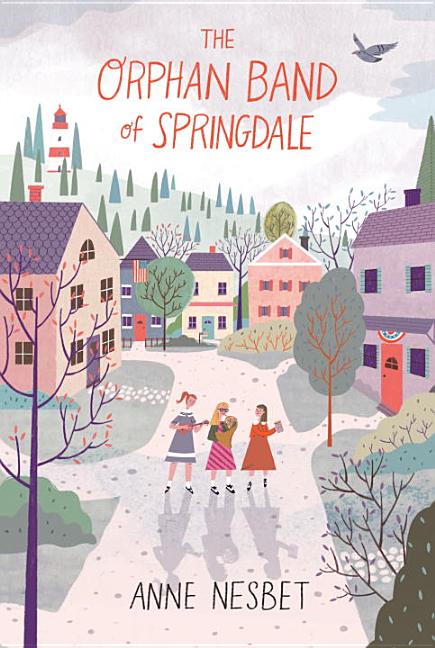Book Descriptions
for The Orphan Band of Springdale by Anne Nesbet
From Cooperative Children's Book Center (CCBC)
In spring, 1941, Augusta (Gusta) Hoopes Neubronner arrives in Springdale, Maine, with a battered French horn and the hope of finding a long-lost wishing coin. Her mother is working in New York City. Her father, a German immigrant, is on the run from authorities for his work as a labor organizer. Gusta’s Grandmother Hoopes runs an orphanage, and Gusta is deemed an honorary orphan by Josie, 14, the welcoming and unfailingly upbeat oldest among her charges. While some find Gusta’s German last name suspicious given the war in Europe, at home, at school, and in the community she earns the respect and affection of many, including the town occulist, another German immigrant, who gives her a job so she can work off the cost of spectacles that radically alter—and improve—her vision. When Josie, Gusta, and Gusta’s cousin Bess form a band, it gives Gusta reason not to sell her beloved French horn, which she’s been considering. Gusta hasn’t found the wishing coin, and the horn might bring enough money to pay for surgery Bess’s papa needs after a mill accident. All her hopes come crashing down before everything works out fine in this warm, heartfelt work of historical fiction full of period details that give it both veracity and charm. (Ages 8–11)
CCBC Choices 2019. © Cooperative Children's Book Center, Univ. of Wisconsin - Madison, 2019. Used with permission.
From the Publisher
With the United States on the verge of World War II, eleven-year-old Gusta is sent from New York City to Maine, where she discovers small-town prejudices — and a huge family secret.
It’s 1941, and tensions are rising in the United States as the Second World War rages in Europe. Eleven-year-old Gusta’s life, like the world around her, is about to change. Her father, a foreign-born labor organizer, has had to flee the country, and Gusta has been sent to live in an orphanage run by her grandmother. Nearsighted, snaggletoothed Gusta arrives in Springdale, Maine, lugging her one precious possession: a beloved old French horn, her sole memento of her father. But in a family that’s long on troubles and short on money, how can a girl hang on to something so valuable and yet so useless when Gusta’s mill-worker uncle needs surgery to fix his mangled hand, with no union to help him pay? Inspired by her mother’s fanciful stories, Gusta secretly hopes to find the coin-like “Wish” that her sea-captain grandfather supposedly left hidden somewhere. Meanwhile, even as Gusta gets to know the rambunctious orphans at the home, she feels like an outsider at her new school — and finds herself facing patriotism turned to prejudice, alien registration drives, and a family secret likely to turn the small town upside down.
It’s 1941, and tensions are rising in the United States as the Second World War rages in Europe. Eleven-year-old Gusta’s life, like the world around her, is about to change. Her father, a foreign-born labor organizer, has had to flee the country, and Gusta has been sent to live in an orphanage run by her grandmother. Nearsighted, snaggletoothed Gusta arrives in Springdale, Maine, lugging her one precious possession: a beloved old French horn, her sole memento of her father. But in a family that’s long on troubles and short on money, how can a girl hang on to something so valuable and yet so useless when Gusta’s mill-worker uncle needs surgery to fix his mangled hand, with no union to help him pay? Inspired by her mother’s fanciful stories, Gusta secretly hopes to find the coin-like “Wish” that her sea-captain grandfather supposedly left hidden somewhere. Meanwhile, even as Gusta gets to know the rambunctious orphans at the home, she feels like an outsider at her new school — and finds herself facing patriotism turned to prejudice, alien registration drives, and a family secret likely to turn the small town upside down.
Publisher description retrieved from Google Books.


